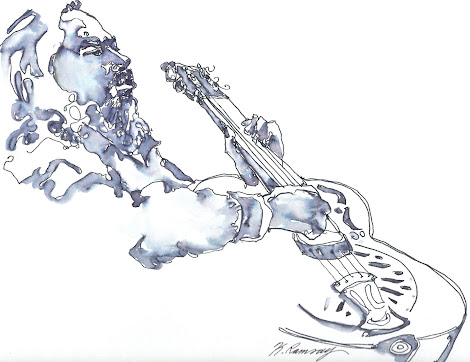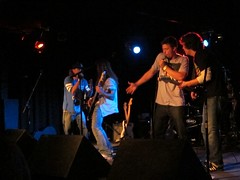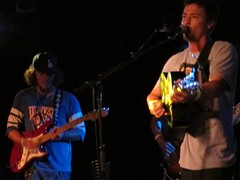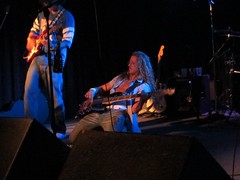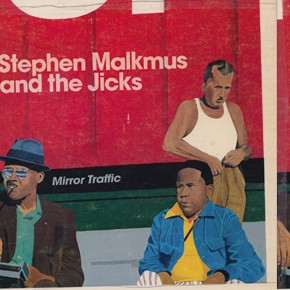9 September 2011 (Aggie Theatre, Ft. Collins CO)Another strong show by Roger Clyne. Young openers, Stud Mushroom, made a good splashIt was an interesting line up Friday night. A young local band, Stud Mushroom, zipped through a ska flavored take on classic rock with some modern twists. Then country artist Lydia Loveless and her band came out and played their country rock set. Finally, Roger Clyne and Peacemakers brought their southwestern rock that bridges country, alt rock, and Americana. One of these bands was a less obvious fit for the night.
On the surface, you'd expect the local band to be the odd man out, but Stud Mushroom's enthusiasm fit well with the Peacemaker's life affirming message. Instead, Clyne's tour mate Lydia Loveless was the mismatch. All of the acts featured solid musical talent, but for stage presence and energy, Stud Mushroom and the Peacemakers were aligned.
Stud Mushroom
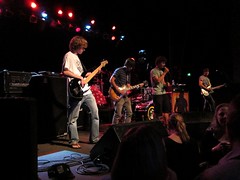
When I walked in and heard
Stud Mushroom, I wasn't sure I was in the right club. The fresh-faced teens kicked off some shimmery indie pop that sounded great, but seemed an odd pairing with Roger Clyne's rootsier songs. It turns out that those first couple of tunes had been misleading. Most of their songs were hard rocking and funky with a heavy penchant for ska beats. That's still a stretch from the Peacemakers, but the band's positive energy outweighed any stylistic differences.

Stud Mushroom was having the time of their lives. They bounced from song to song and their joy reflected into the crowd. Guitarist Adam Petty stole the show, between his phenomenal playing and enthusiastic stage presence. From the sparkly indie pop start through riffing through Hendrix tunes, he had a good range of guitar sounds and a tasteful ear for fills. He sealed the deal during the couple of songs he played trumpet on. Dancing a bit, he was slightly self-conscious and mugged to the audience, but he couldn't contain himself. That provided a great spark for audience connection, which is where the band meshed perfectly with the Peacemakers style.

Petty stood out, but the rest of the band held their own technically. Drummer Jonah Green in particular was impressive. His fills powered the songs, with a lot of subtle syncopation that kept the rhythm section interesting and engaging. Good drumming takes a lot of focus. Drummers who can stay in time can still blow their job by getting too complex. When the fills threaten the sense of the basic beat, the song becomes a lost cause. It was great to hear a drummer that can develop rhythmic complexity without overwhelming the groove.
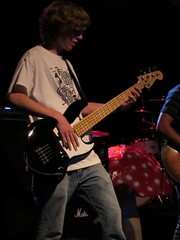
The other players were all great, too. This showed in the versatile arrangements that nailed their breaks, offered dynamics, and sailed through rhythmic changes. Despite their youthful appearance, Stud Mushroom played like a mature group of musicians with years of experience together.
A couple of the more interesting moments were a ska flavored take on
Voodoo Child (Slight Return) and a cover of Project Hero's mashup of
Immigrant Song and
Bulls on Parade (Rage Against the Machine)
. Both songs had their surprises as the band poured themselves into interpreting the tunes.
Stud Mushroom's only weakness was needing a more dynamic stage presence to expand on that audience connection. Lead singer Austin Gloss should put some energy into building his stage persona to match his singing skills. That's a minor gripe though for a band that nailed their set.
(
additional photos of Stud Mushroom from Brian Miller)
Lydia Loveless
 Lydia Loveless
Lydia Loveless started out her set with a classic country sound. With a strong voice sounding of Loretta Lynn, she and her tight backing band had my feet tapping. The guitar player and drummer shared a connection, reading each other's signals, and the standup bass player was dynamic, whipping his head to the beat. Loveless also contributed guitar, providing a good foundation rhythm to hold the songs together.

That first song, like several in the set were well-written and nicely arranged. Within a couple of songs, though, she lost that momentum. The moment might have been the break between the second and third songs. After a fifteen second pause, Loveless started strumming her guitar, but doesn't quite start the song. After another briefer pause, she finally spoke up. She thanked Roger Clyne for having them on the tour, but her voice was detached and disconnected. Combined with the moodier rock of the third song, it started building a wall between Loveless and the audience.
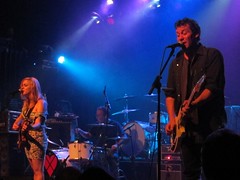
Lydia Loveless' bio talks about her roots in the Columbus, Ohio punk scene and maybe that's where her diffidence came from. Or maybe she was just nervous. Either way, she sounded like she was going through the motions and didn't really want to be there. A singer/songwriter like Loveless needs to make that linkage with the audience, because without it, it robs the songs of their spark.
Songs like
Steve Earle (an amusing send up about him stalking her) and
Crazy seemed well written. They could have contributed to a great set. The mix of straight country and country rock is great niche. Unfortunately, her performance dissuaded me from getting her album. Hopefully, Loveless will learn a bit from Clyne on this tour and grow as a performer.
Roger Clyne
 Roger Clyne
Roger Clyne is one of the most dependable performers I know. I try to catch him whenever he's in town, to get another taste of the emotional sacrament he offers. Clyne's connection with his audience keeps getting deeper. With the crowd singing along with every number, he presides over his shows as much as performing.

Aside from the good vibrations, I love the yin and yang of the shows: the pace is always comfortable, feeling loose and unstructured, yet the band flows together as coordinated as a school of fish. Similarly, the emotional rawness of some of the songs, like
Green and Dumb or
Marie add depth to the thrashy joy of songs like
I Do.

The setlist flowed in a way that proved the band's genius, whether planned or intuitive. The high energy bounce of
Banditos was channeled into the intensity of
Marie. After that, a brief check in with the audience created the space for the mood to turn more thoughtful with
Your Name on a Grain of Rice.

It goes without saying that the rest of the Peacemakers contributed their share, both musically and psychically: Jim Dalton's constant grin as he effortlessly added the perfect guitar fills, PH Naffah's rock solid presence behind the drums, and Nick Scropos' energetic bass work all created the mood. While Roger Clyne is a wonderful solo entertainer, the Peacemakers give him the space to stretch out and take the songs further.


Throughout the set and eventual encore, Clyne accepted the love of the crowd, shared his gratitude, and reminded us all that we were a community. The encore closed with a solo acoustic version of
Mekong, offering the perfect summation of the show: "
Thank you for your time and here's to life".

More photos on my
Flickr.
 Uncertain Vista sprawls for 60 minutes and 21 songs, allowing enough room for the two or three bands playing to each show off their signature sounds. Of the collection, I prefer the indie rock centered band the most, but the musicianship is strong across the board. Of course, it's not a collection of bands, it's just the split personalities of Sills and Smith, jumping between indie/alt rock and Americana (Canadian style)/folk.
Uncertain Vista sprawls for 60 minutes and 21 songs, allowing enough room for the two or three bands playing to each show off their signature sounds. Of the collection, I prefer the indie rock centered band the most, but the musicianship is strong across the board. Of course, it's not a collection of bands, it's just the split personalities of Sills and Smith, jumping between indie/alt rock and Americana (Canadian style)/folk.